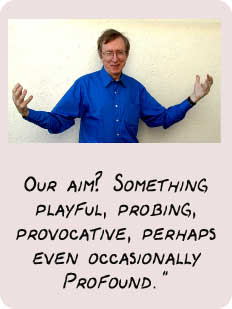|
|
Katalina Groh, Larry Prusak: Some of the world's leading thinkers |
| What do the presenters intend with this symposium? |
 |
Steve
Denning
What do we intend? Well, for
one thing, weíre not going emerge from behind a curtain wearing long white
robes and carrying a couple of stone tables, bringing some sort of futuristic
message from a Higher Power.
|
| be plodding, somber, or heavy handed,
but rather spirited and charming. Weíre exploring the possibility that
practical value might co-exist with genuine artistic integrity, something
to get excited about. We want a century that is more responsive to modern
life.
We are not trying to impose a new kind of narrative logic and structure on an illogical world. Rather, we are trying to weave together the threads that will make the world better. Where science can make progress and make a useful contribution, thatís beautiful. Where it canít it should step aside and let its sister contribute. We are not promising sugary outlooks just to make people feel good. We have a pragmatic angle of attack. We prefer what works. There are limits on the utility of abstract and traditional manner of attacking things. Narrative provides another mode of approach, that ultimately gets results. Weíre not opposed to science. What weíre trying to do is bridge the distance between science and story and still keep both sets of supporters on board. Very few thinkers have been able to do this. Itís as though the war has become religious, and if loyalty to one faction guarantees a negative reaction from the other. If youíre not for us, youíre against us. The defense of science has become strident, with all the bulldozing, bullying tactics reminiscent of the Inquisition. The accomplishments of science, as well as its crimes, can be ticked off a list. The attack on narrative has been equally ferocious. We cannot pretend to be comprehensive, instead just a little bit suggestive, a hint, an inclination towards the direction of change. We donít necessarily agree with each other. We may spark some new insights from the clashes that ensue. We havenít had time to explore every nook and cranny of each otherís beliefs. |
| Books and videos on storytelling *** In Good Company : How Social Capital Makes Organizations Work by Don Cohen, Laurence Prusak (February 2001) Harvard Business School Press *** The Social Life of Information, by John Seely Brown, Paul Duguid (February 2000) Harvard Business School Press *** The Springboard : How Storytelling Ignites Action in Knowledge-Era Organizations by Stephen Denning (October 2000) Butterworth-Heinemann *** The Art of Possibility, a video with Ben and Ros Zander : Groh Publications (February 2001) |
| The views expressed on this website are those of the authors, and not necessarily those of any person or organization |
| Site optimized in 800x600: webmaster CR WEB CONSULTING |
|
|
|
|